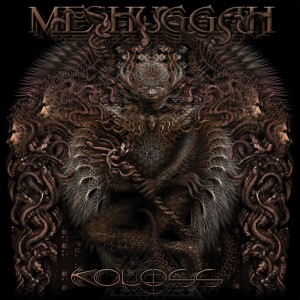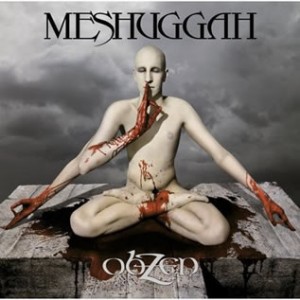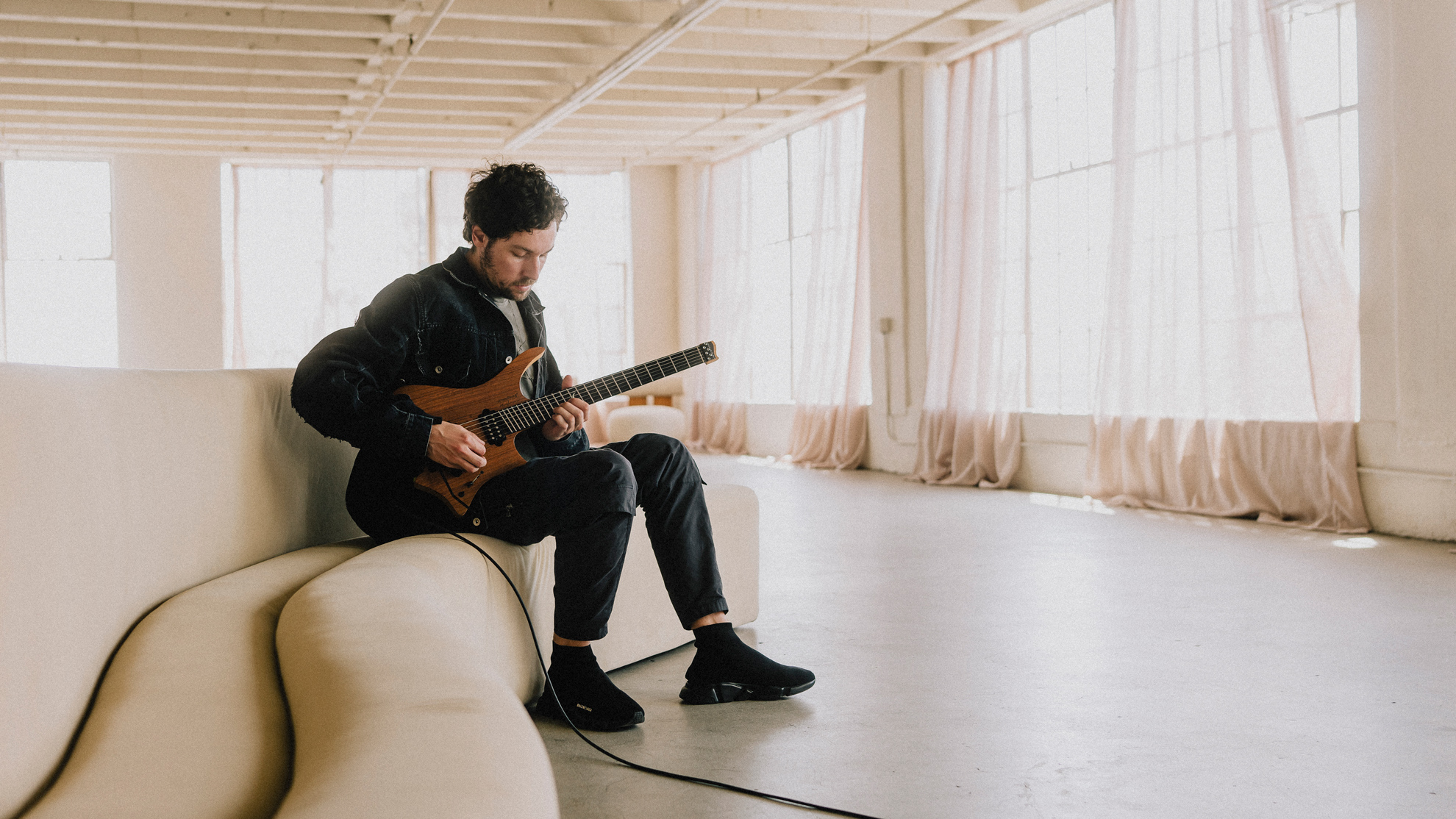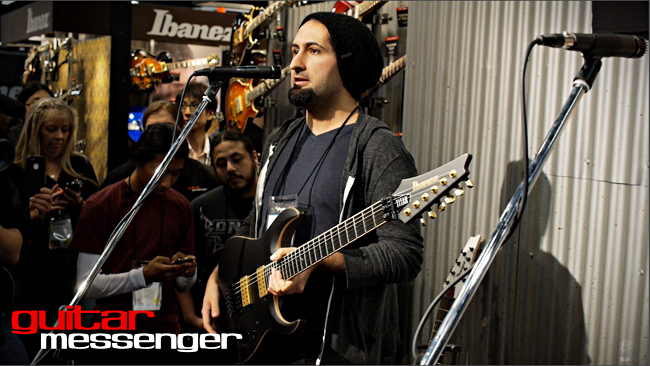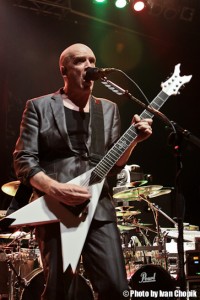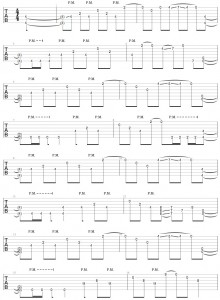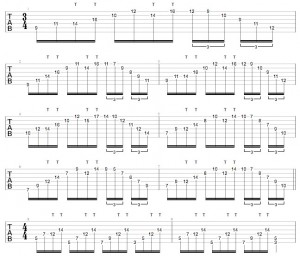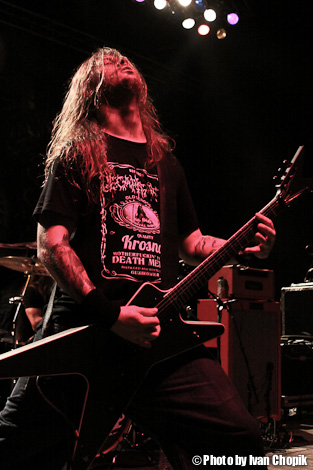
Vogg of Decapitated
Leave it to the world of metal to produce a concert bill where the outfit called Decapitated is the “normal” one. Still, Poland’s death-metal droogs seem the perfect outfit to inaugurate the Ophidian Trek’s local stop at the Fillmore in San Francisco. Their brand of high-velocity punishment kicks the evening into gear for the loyal early crowd. But surely Decapitated’s phoenix-like return to the touring circuit merits the early draw.
Having risen in defiance of the 2007 fatal car crash that claimed two members, founding guitarist Wacław “Vogg” Kiełtyka & Co. pummeled through a blistering set as lean as it was mean. Drawing largely from last year’s triumphant Carnival Is Forever, Vogg flayed out grooves that at once recalled Pantera and Cannibal Corpse. But if Decapitated were loyal keepers of extreme traditions, Baroness was ready to display some new inspirations from traditional extremes.
As the black clad ranks continued to file into the Fillmore, there was a lingering murmur as to why a band as storied as Decapitated was opening for some young band they’ve never heard of. To those patrons, Baroness offered a solid retort even if it took a few minutes to get it out.
They slinked onto the stage to the boisterous cries of a few and the furrowed brows of many. The extended swell of feedback and drones cooled the floor and washed some skeptics back to the beer line. But the pint orders were soon enough drowned out as the feedback crested and crashed into the gallop of ‘A Horse Called Golgotha.’
Baroness are only three albums into their career and yet they’ve already refined their sound into a bristling beast, impeccably arranged, while unapologetically unruly. Like Isis covering Iron Maiden, the quartet paints traditional metal harmonies in a wooly haze, baking classic breakneck rhythms in southern sludge. But unlike their fellow Georgia-bred brethren Mastodon, Black Tusk, and Kylesa, Baroness loans their music a certain patience that affords it a beauty rarely achieved with this brand of music.
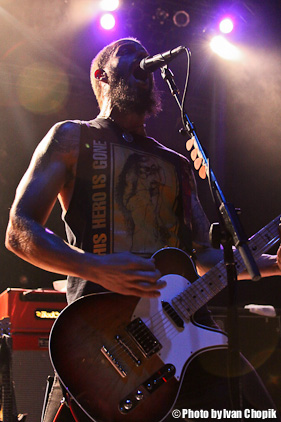
John Baizley of Baroness
‘Steel That Sleeps the Eye’ waxed from a strummed hymnal into a discordant cascade, like Pink Floyd crossing the cusp of a bad acid trip. The guitar interplay between Peter Adams and John Baizley was hypnotizing, even if their tandem vocal trials occasionally broke the spell.
To the Decapitated devotees who were wondering who they were, Baroness presented a pretty convincing introduction. And to those already in the know, the band played a couple of songs off the new album Yellow & Green and tore through the Red Album cut ‘Isaak’ before giving the stage to the night’s main event.
It’s a pretty sturdy testament to Meshuggah’s legacy to see their name enthroned at the top of such a formidable bill as this. They’ve now spent over two decades tracing and honing their polyrhythmic take on thrash, smelting metal traditions to a heavy sludge to be recast as they see fit.
Their riffs are insistent and unwavering, like runes carved in a language they speak only amongst themselves but within a public forum. Their arrival to the stage seemed not just a vindication of their persistence, but the realization of portents of their breakthrough Destroy Erase Improve.
Digging into opening riff of ‘Obsidian,’ it quickly became apparent just how different their music is from the studio to the stage: the riffs were identical and drummer Tomas Haake proved to be the human cephalopod in person as much as on record, but the difference lies in how the music comes across to the listener.
Unlike a good deal of metal, Meshuggah albums aren’t always the best prescription for pumping adrenaline. Their elliptic rhythms and epileptic blasts writhe more than they charge, like a knot of snakes trying to untie itself. Between the speakers the rhythms can hijack your heart into beating an alien pulse. Rather than propelling, their music transforms.
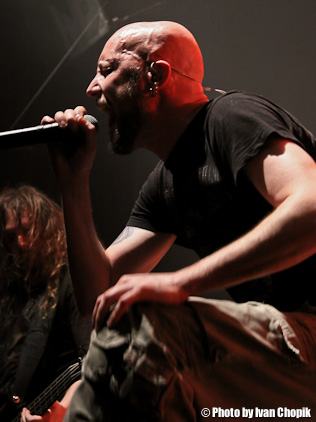
Jens Kidman of Meshuggah
But to see them perform these same writhing monoliths of sound on stage is a monster of a totally different breed. Protruding jaws hide beneath wild manes thrashing a tortuously slow four count. As hyperkinetic as the individual parts may be, Meshuggah’s performance readily displays how they all mesh across simple meter.
Despite opening with ‘Obsidian’ from 2002’s Nothing and the obligatory encore of that included ‘New Millenium Cyanide Christ’ and ‘Future Breed Machine,’ the bulk of the almost two hour set is weighted heavily towards Koloss and obZen.
They highlighted the choicest cuts of each beneath swirling LEDs and silk-screen backdrops that suggested Byzantium by way of H.R. Giger. A comprehensive career revue might have made for a more disjointed experience (granted, to the first time listener, their music almost inevitably feels so anyway), but the reliance on more recent material confirmed that the band has finally arrived in the truest sense.
If the music of their past has been underscored with restless discomfort, the fact that only now has the extreme metal scene both elevated them to headliner status and welcomed throngs of imitators to their playlists speaks volumes to the band’s accomplishments.
Meshuggah has toiled for years hammering their take on metal into their own twisted form that reflects them, and now they’re using it to charge forward. It’s their new driving music, and a tune we should be all comfortable to ride with for many tours to come.




